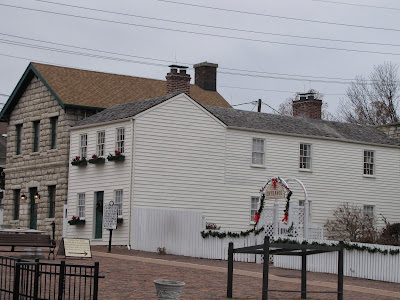All day long I traveled the edge of a storm. Snow and icy roads were predicted. Grey highways lasted for three hundred miles until the last fifteen minutes when I finally came into light snow shifting back and forth across the road. Home Scot free. I will be staying a couple of days with an old friend in Zionsville, Indiana.
Yesterday morning I toured Mark Twain's childhood home in Hannibal, Missouri. With the storm approaching, I had considered the wisdom of delaying travel just to walk old floors and peer into low-ceiling rooms that Mark Twain hadn't visited for over a hundred years. For a brief moment, I thought about just cruising by and taking a photo of the quaint two-story house. But remember, I'm a houser. I'm ever curious to see what is behind a facade. Cross a beloved author or historical figure with a house and I am even more intrigued.
I recently read the description of a profession new to me called "geographical historian". Geography asks questions of "Where?" and "Why there?" and history asks the questions "When?" and "Why then?" I'm curious now why we don't have a profession titled something like "domigraphical historian." The domigraphical questions would be "Where is the domicile?" and "Why this particular domicile?" Now you might be thinking that I'm walking the edge between fantasy and reality, but let's look at the idea that a house, a room or a place retains some memory, some meaning in its architectural configuration worth understanding in an historical context.
 |
| Mark Twain's Childhood Home |
"If these walls could talk..." You've heard this expression or maybe even said it yourself. Our language uses an architectural term for listening in on someone else's conversation. Mark Twain could have eavesdropped on many a conversation in his house. The eavesdrop of two thatch-roofed houses in England was a designated distance apart. Water washing off of one roof couldn't therefore damage the house next door. The distance between the houses was so narrow that inhabitants of one house could still "eavesdrop" on their neighbor's goings-on. Samuel Clemens, later know as Mark Twain, would have heard adult conversations, turns of phrases, and interchanges between his parents and their one slave. The interior walls of his home were thin. The rooms few in number. His family's poverty blessed him with a richness of conversation meant for him to hear and likely those conversations that he was not meant to hear. Had he been in a larger domicile, he might have missed much of the complexity of his world with its shifting racial relationships.
When he became prosperous Mark Twain's favorite desk was an intricately carved Eastlake. His childhood however was lived in poverty. His home was furnished in roughly-made materials. I can't help but wonder if the visually spare rooms of his home encouraged him to take note of the most minute of details. His writing is dense with humorous characters, their clothing and hair described as though the character had just walked into the room. The rooms disappear and the character is the focus. Twain's skills in discerning a good story from a bad one, he credited with his work as an apprentice printer, but his eye and ear for detail had been with him from an early age, an early home.
Hannibal is still a diminutive town abutting the Mississippi with houses ranging from derelict to elegant. If Mark Twain visited Hannibal today, he would have recognized much of it. The window of his room may have looked out to the river, the steamboats and the bustle of the wharf.
When he became prosperous Mark Twain's favorite desk was an intricately carved Eastlake. His childhood however was lived in poverty. His home was furnished in roughly-made materials. I can't help but wonder if the visually spare rooms of his home encouraged him to take note of the most minute of details. His writing is dense with humorous characters, their clothing and hair described as though the character had just walked into the room. The rooms disappear and the character is the focus. Twain's skills in discerning a good story from a bad one, he credited with his work as an apprentice printer, but his eye and ear for detail had been with him from an early age, an early home.
Hannibal is still a diminutive town abutting the Mississippi with houses ranging from derelict to elegant. If Mark Twain visited Hannibal today, he would have recognized much of it. The window of his room may have looked out to the river, the steamboats and the bustle of the wharf.
 |
| View across the Mississippi from the Steamboat Wharf |
I passed by Springfield, Illinois, and thought about Abe Lincoln's log cabin. I really didn't know if it still existed or not, but much has been made of his start in life in a simple log cabin. (I later found out that there were attempts to locate the exact logs and to reconstruct the cabin after a fashion.) The log cabin bespeaks of a particular time, of hard work and of determination. I wonder today what kind of character we are making from children's rooms filled with plastic and overflowing with stuff. Mark Twain might not have become Mark Twain were his childhood home a modern home.

No comments:
Post a Comment
Please leave comments. They are most welcome.